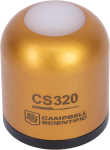
Ideal for long-term deployment in harsh conditions






Visão Geral
The CS301, manufactured by Apogee Instruments, measures total sun and sky solar radiation for solar, agricultural, meteorological, and hydrological applications. Its spectral range of 360 to 1120 nanometers encompasses most of the short-wave radiation that reaches the Earth's surface. Because the CS301 connects directly to Campbell Scientific data loggers, the output of this pyranometer can be collected on site, as well as remotely.
This pyranometer features an IP67-rated, marine-grade 316L connector that allows the user to easily swap sensors for recalibration or to replace damaged cables.
Leia maisBenefícios e Características
- Compatible with most Campbell Scientific data loggers
- Designed for continuous, long-term, unattended operation in adverse conditions
- Measurement waveband of 360 to 1120 nm
- Dome-shaped head prevents water from accumulating on the sensor head
imagens

Produtos Relacionados
Descrição Técnica
The CS301 uses a silicon photovoltaic detector mounted in a cosine-corrected head to provide solar radiation measurements. Its dome-shaped head prevents water from accumulating on the sensor head. To eliminate internal condensation, the sensor head is potted solid and the cable is shielded with a rugged Santoprene casing. The CS301 is calibrated against a Kipp & Zonen CM21 thermopile pyranometer to accurately measure sun plus sky radiation.
Compatibilidade
Please note: The following shows notable compatibility information. It is not a comprehensive list of all compatible products.
Data Loggers
| Product | Compatible | Note |
|---|---|---|
| CR1000 (retired) | ||
| CR1000X (retired) | ||
| CR300 (retired) | ||
| CR3000 (retired) | ||
| CR310 | ||
| CR350 | ||
| CR6 | ||
| CR800 (retired) | ||
| CR850 (retired) |
Additional Compatibility Information
Sensor Mounts
Accurate measurements require the sensor to be leveled using a 18356 leveling fixture. This leveling fixture incorporates a bubble level and three adjusting screws. The 18356 mounts to a crossarm or a tripod or tower mast using the CM225 mounting stand. The CS301 should be mounted away from all obstructions and reflective surfaces that might adversely effect the measurement.
Data Logger Considerations
One differential analog input channel per probe is required.
Especificações
| Sensor | Silicon photovoltaic detector mounted in a cosine-corrected head |
| Measurement Description | Measures sun plus sky radiation |
| ISO Classification | Class C (second class) |
| Light Spectrum Waveband | 360 to 1120 nm (wavelengths where response is 10% of maximum) |
| Measurement Range | 0 to 2000 W/m2 (full sunlight ≈1000 W/m2) |
| Output Range | 0 to 400 mV (full scale output) |
| Absolute Accuracy | ±5% for daily total radiation |
| Spectral Range | 360 to 1120 nm |
| Calibration Factor | 5 W/m2/mV |
| Cosine Correction Error | ±5% at 75° zenith angle; ±2% at 45° zenith angle |
| Temperature Response | 0.04 ± 0.04% per °C |
| Response Time | < 1 ms |
| Long-Term Stability | < 2% per year |
| Operating Temperature Range | -40° to +70°C |
| Relative Humidity Range | 0 to 100% |
| Sensitivity | 0.2 mV/W/m2 |
| Diameter | 2.4 cm (0.9 in.) |
| Height | 2.5 cm (1.0 in.) |
| Weight | 65 g (2.3 oz) with 2-m (6.6-ft) lead wire |
Documentos Relacionados
Lâminas do produto
Manuais
Trabalhos técnicos
Conformidade
Perguntas Frequentes Relacionadas
Number of FAQs related to CS301: 4
Expandir todosRecolher todos
-
Compare the sensor against a recently calibrated CS301 on a clear, sunny day with the sun overhead. Ensure that the sensor being used as a reference is also level.
-
No. It’s not the range that makes a sensor a quantum sensor. It is the type of light filter used with the photocell that only allows specific wavelengths of light in the PAR frequency range to strike the photocell.
-
The leveling base provides physical stability and helps ensure the sensor is leveled correctly. It is not recommended to use the sensor without the base. The sensor mounts to the base with an included bolt. However, a user-supplied plate with a hole drilled in it could be used instead to accept the sensor’s mounting bolt.
Note: Whatever mounting method is used, the sensor has to be levelled to operate correctly.


